Why Is My Pigeon Losing Feathers?
Like any other birds, pigeons can have health issues. While pigeon pox, paramyxovirus, canker, and E. coli are the most prevalent, feather loss is also quite common. And when your pigeon starts to lose feathers, it would be normal for you to ask yourself the question, “why is my pigeon losing feathers?”
The most common reasons pigeons lose feathers are illnesses, stress, molting, and nutritional deficiencies. General weakening for exposure to the sun and getting rubbed against the trees while flying can also make the pigeons lose feathers.
Now the elephant of the room is, what do you need to do to help your pigeons while they are losing feathers? Can you do anything at all? Read through to find out!
Read more about pigeon blogs:
Do Pigeons Lose Their Feathers?
Pigeons are not an exception when it comes to losing feathers. Like all birds, they too can shed off. And the loss of feathers can happen naturally. The process is called molting, which will typically occur periodically throughout their lives.
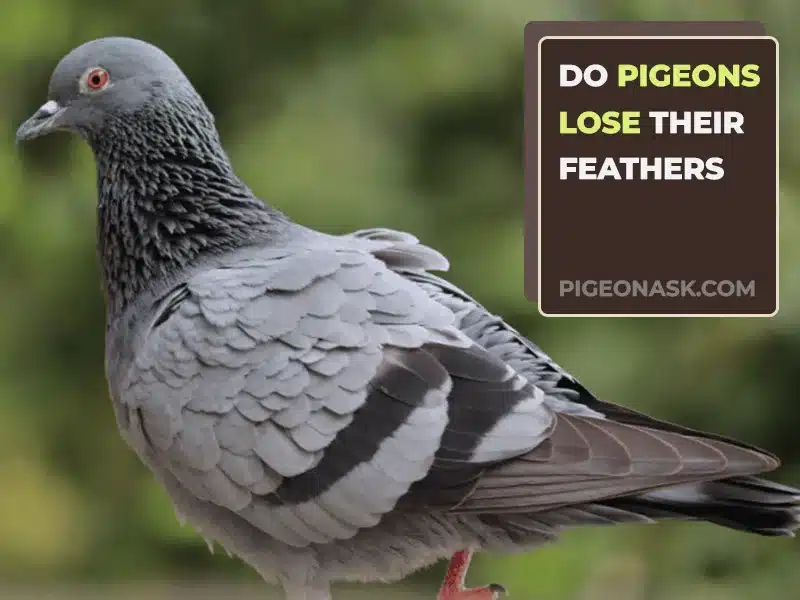
Another natural reason there can be feather loss is accidental rubbing while on the flight. These birds can collide with the neighboring trees, making them lose some of the weak feathers of their bodies.
What Causes Pigeons to Lose Feathers?
If you really want to assess the situation, you should understand all the possible causes that can make the pigeons lose feathers. And they are:
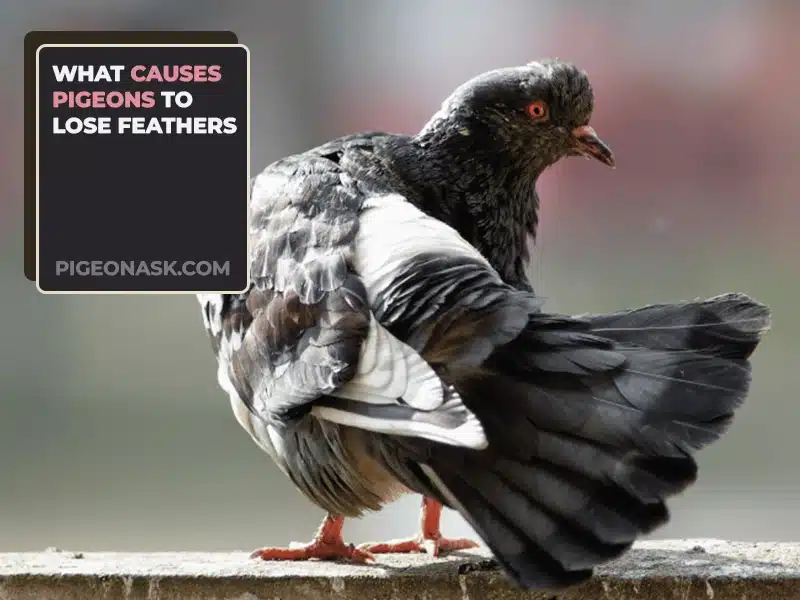
1. Molting Causes Feather Loss
All normal birds go through a feather wear-out phase during the busy time of the year. It can happen once every year. However, the frequency can vary, especially for the pigeons that spend most of their day indoors.
Nonetheless, there will be bare patches when there is feather loss for molting. And this patch will be there until the new feathers grow.
2. Loss of Feathers Due to Stress
Stress in pigeons can induce destructive behavior. To cope with the stress, the birds will pluck their own feather. And in most cases, they will pluck the ones not ready to molt. In fact, a bird can pluck all its feathers out in 24 hours just because of stress.
3. Virus and Bacteria Causing Feather Loss
There are some viruses and bacteria that can make pigeons lose their feathers. In this case, the feather loss will be everywhere in the body, which includes the head and wings.
4. Nutritional Deficiencies
A diet that lacks the essential vitamins and minerals can induce the feather loss issue. That is why it is vital to check on the nutritional values of bird feed before relying on them too heavily.
What Are the Signs of Feather Loss in Pigeons?
You will find several telltale signs when the bird is going through a feather loss phase. Among them, these are the most crucial ones:
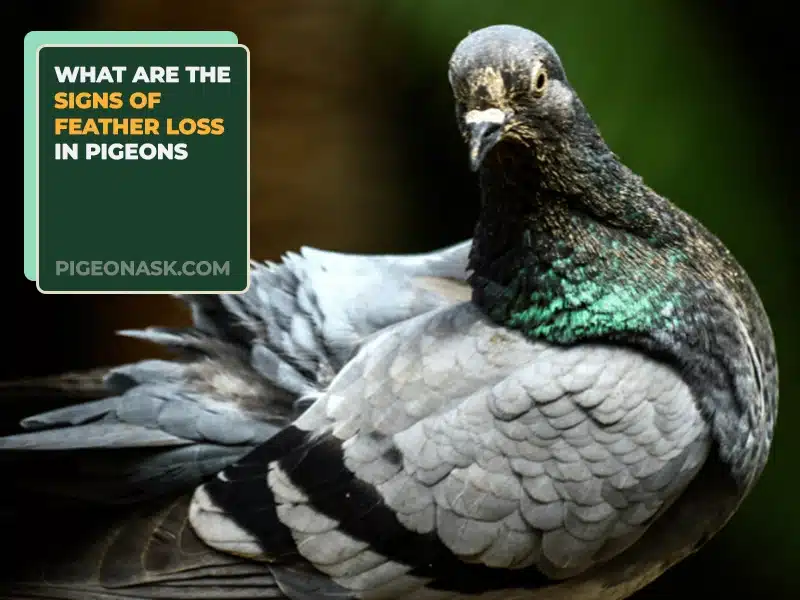
1. Bare Patches on the Skin
The loss of feathers will leave bare patches on the skin. And this is an early sign of feather loss.
2. Frayed or Broken Feathers
Frayed or broken feathers are a sign of feather loss. It can also be a sign of injury. So, you can not just stick to this sign to get to a conclusion
3. Increased Preening
When the birds lose feathers, they will groom themselves more often. You can assess the issue further by checking their bodies and seeing whether they have bare patches.
4. Ragged Overall Appearance
A ragged or dull appearance is a sign of feather loss. Healthy pigeons should look clean and fluffy.
5. Decreased Activity Throughout the Day
Pigeons are known for being active throughout the whole day. But for sickness-induced feather loss, they can become less active due to discomfort.
6. Loss of Weight
When the feather loss issue is severe and continues for a good while, the pigeons can start to lose weight. This is a very late sign; you should not let the condition get to this stage.
Can a Pigeon Grow Its Feathers Back?
Feather growth is a natural process in pigeons. However, there is a big if. The feathers might not grow back if the underlying cause of the feather loss is not addressed.
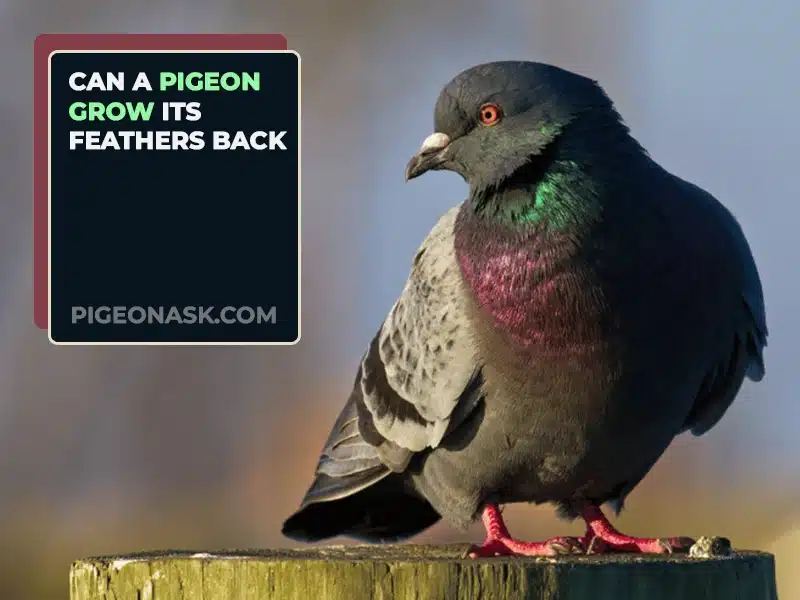
On the other hand, if the feather loss was due to molting, they will automatically grow back. The time that pigeons take to regrow their feathers varies. It can take several months or several weeks to regrow the lost feathers.
How Do I Know If My Pigeon Is Molting?
Pigeons will face many issues with their day-to-day lives when they lose feathers. For example, when they lose flight feathers, they will not be able to fly correctly anymore.
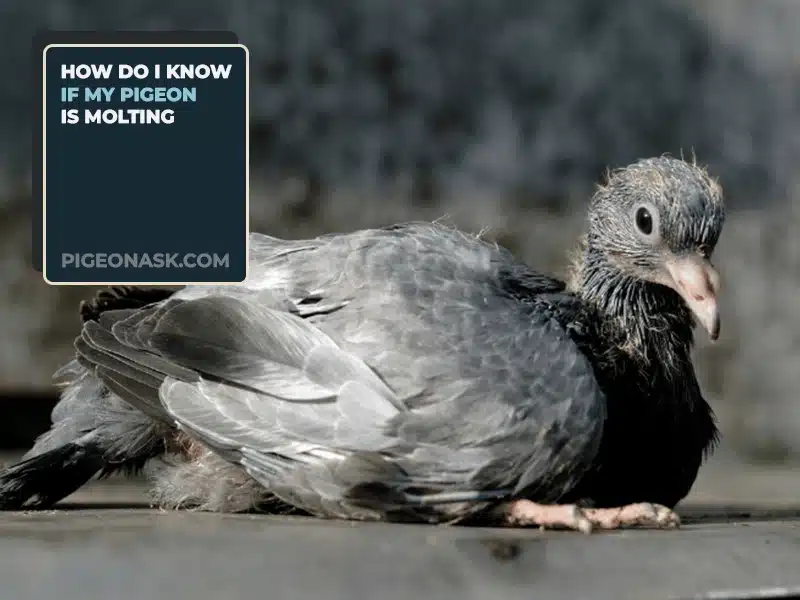
However, that’s not all! You can check the body of the bird and look for bare patches. If you find any and if the pigeon does not have any other severe sicknesses, you can be sure that the bird is molting.
Furthermore, there is another way to tell whether your pigeon is molting. Let the feather loss continue, and check if the pigeon is growing back new feathers. If there are new feathers, you can be sure that the bird is going through a natural molting.
What Do You Feed Pigeons When Molting?
A pigeon’s body undergoes a lot during molting. For that reason, it is important to focus on their diet a little when they are losing feathers. Here are a few things to consider:
1. Increase the Protein Count
Pigeons will need a diet that is high in protein to support feather growth. And good sources of protein include legumes, grains, and seeds.
2. Add More Essential Fatty Acids
These birds will need essential fatty acids to regrow the lost feathers. Increase the amount of flaxseed or mix their feed with fish oil or canola oil.
3. Feed Them Food with Enhanced Minerals and Vitamins
Vitamins and minerals will help the birds to grow their feathers quickly. Include more fruits and vegetables in their diet.
4. Ensure a Continuous Water Supply
Make sure that the birds have easy access to water. Having clean and fresh water will ensure that they are properly hydrated throughout the day. That will make it easier for them to grow out the lost feathers.
Frequently Asked Questions:
01. Why Is My Male Pigeon Losing Feathers Around His Neck?
If the male pigeon is losing feathers around his neck during the molting season, it can be for molting. In case you didn’t know, molting feather loss can happen all around the body. And it would be normal for you to find bare patches around the neck.
02. What Time of Year Do Pigeons Molt?
Typically, the pigeon molting period will start in August. And the feather loss can continue all the way through mid-November. For some pigeons, the molting can start late, and it can end late.
03. How Long Do Pigeons Molt?
Generally, the pigeon will need about 160 to 170 days to fully molt out. However, there are factors that can vary during this period. For example, the duration will differ depending on the breed and the bird’s environment.
Wrapping Up
To conclude, if your pigeon is losing feathers, it can be due to natural molting, illness, nutritional deficiencies, and stress. And no matter what the case is, it’s a good idea to get the bird checked by a veterinarian.
A pigeon expert will be able to get to the root cause quickly and offer you viable steps that you can do to help the pigeon.
With that said, we hope all the information shared here helped clear all your queries and confusion. And if you want more content such as this one, please consider connecting with us through our Facebook, Twitter, and Pinterest accounts.
Article Reference:
- Rspb.org.uk/birds-and-wildlife/natures-home-magazine/birds-and-wildlife-articles/features/new-feathers-please/
- Greencrossvets.com.au/pet-library/articles-of-interest/why-my-pet-bird-is-losing-feathers/
- Msdvetmanual.com/bird-owners/disorders-and-diseases-of-birds/skin-and-feather-disorders-of-pet-birds
- Versele-laga.com/en/gb/for-your-animal/racing-pigeons/moulting-period/moulting-season-a-crucial-cornerstone
Image Credits: canva.com/photos
